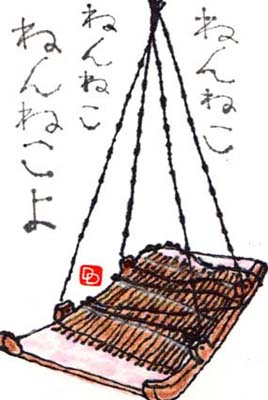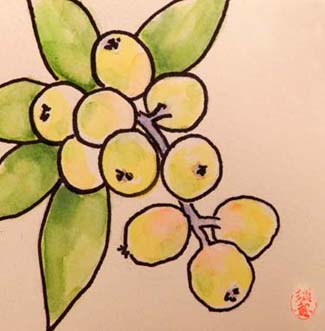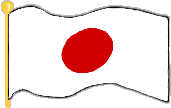ゆりかごのうた (Yurikago no Uta)
The word "yurikago" means "cradle" or "bassinet".
You can find the pronunciation to the song in the notes.

ゆりかごのうた (Yurikago no Uta)
Song of the Cradle
Lullaby
Lullaby
(Japanese)
(English)
ゆりかごのうたを
カナリヤが歌うよ
ねんねこねんねこ
ねんねこよ
ゆりかごのうえに
枇杷の実が揺れるよ
ねんねこ ねんねこ
ねんねこよ
ゆりかごのつなを
木ねずみが揺するよ
ねんねこねんねこ
ねんねこよ
ゆ りかごのゆめに
黄色い月がかかるよ
ねんねこねんねこ
ねんねこよ
A canary sings
A cradle song
Sleep, sleep,
Sleep, child!
Above the cradle,
The loquat fruits sway
Sleep, sleep,
Sleep, child!
A squirrel rocks
The cradle by its rope
Sleep, sleep,
Sleep, child!
Dreams in a cradle,
With the yellow moon shining down
Sleep, sleep,
Sleep, child!
Notes
Pronunciation:
Yurikago no uta
Yurikago no uta o
Kanariya ga utau yo
Nenneko Nenneko
Nenneko yo
Yurikago no ue ni
Biwa no mi ga yureru yo
Nenneko Nenneko
Nenneko yo
Yurikago no tsuna o
Kinezumi ga yusuru
Nenneko Nenneko
Nenneko yo
Yurikago no yume ni
Kiiroi tsuki ga kakaru yo
Nenneko Nenneko
Nenneko yo

Comments
Alicia Smith wrote, "My toddler daughter learned this song at daycare, and she sings it all the time before she sleeps, rocking her dolly."
You can find more versions of Yurikago on Mama Lisa's World Blog. Feel free to add the version you know there or share your memories about this song. You can hear another version here.


ねんねこねんねこ
ねんねこよ
ゆりかごのうたを
カナリヤが歌うよ
ねんねこねんねこ
ねんねこよ
Pronunciation:
Nenneko, nenneko,
Nenneko yo.
Yurikago no uta o
kanari ya ga uta u yo.
Nenneko, nenneko,
Nenneko yo.
Thanks!
Thanks!
Thanks!
Thanks and Acknowledgements
Thanks to Alicia Smith for the translation, the Japanese text and for sharing her video. Alicia wrote, "Translation between the 2 languages is so dissimilar it's difficult, but the meaning goes something like this (translation above)."
Many thanks to Debbie, aka Dosankodebbie for her etegami illustration of a Japanese cradle. Debbie has a wonderful blog featuring her etegami called Dosankodebbie's Etegami Notebook. You can also visit Debbie's etegami shop on Etsy. Here's what Debbie wrote about her illustration, "The cradle is an Ainu cradle. The Ainu are the indigenous people of northern Japan. Much of the translating (and art) I've done over the past fifteen years has been Ainu-related. This type of cradle is called a 'shinta'."
Many thanks to Linda Austin from Moonbridge Books for the second etegami illustration of loquats! Check out Linda's book about her mother's experiences in Japan during WWII.
Arigato gozaimasu! 
























